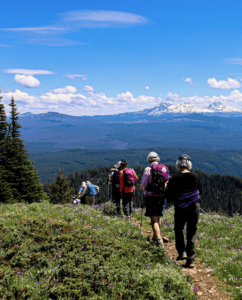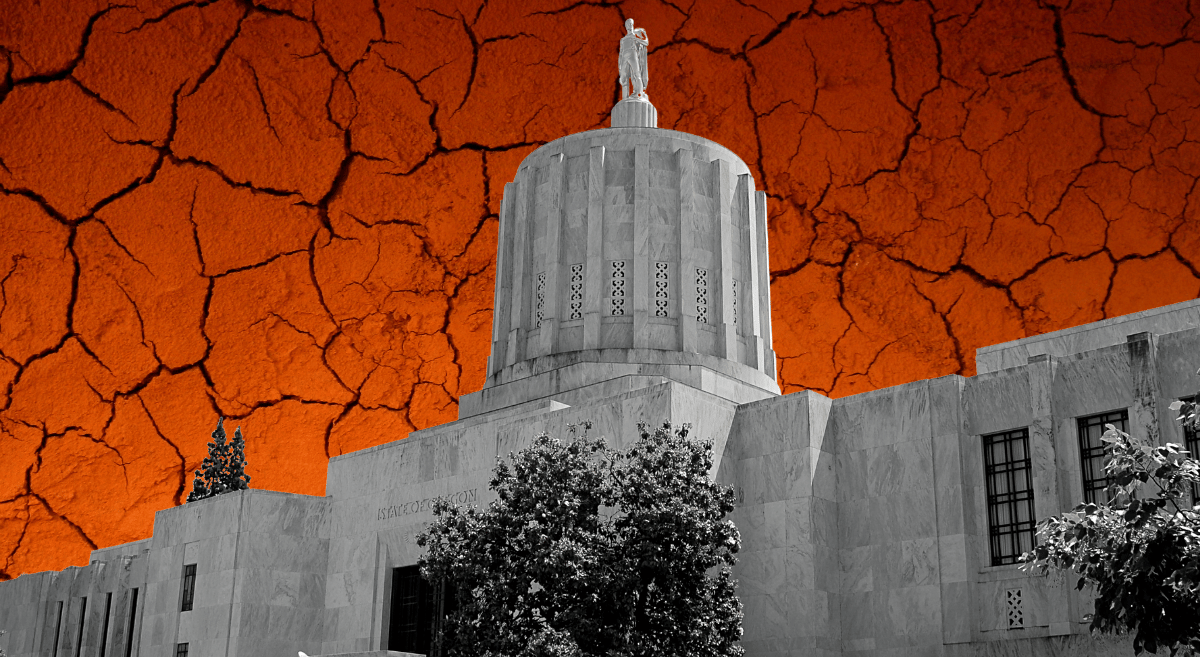Oregon politics and legislating have been one heck of a rollercoaster over the last several years. We’ve had walkouts. There have been truck rallies. We saw a sitting legislator let armed protesters into the Capitol just weeks before the January 6 insurrection. Did I mention that we’ve seen walkouts? Oh yeah, and we had millionaires like Phil Knight try to buy our elections with massive contributions aimed at dividing the electorate with a third-party candidate.
When Democrats emerged victorious (and somewhat decisively so) in the 2022 elections that many political observers thought would be a clear victory for Republicans, and many in the environmental community had high hopes. Gone were the likes of Betsy Johnson, Brad Witt, and Brian Clem – Democratic legislators who made no bones about their unwavering support for the timber industry and other extractive corporate interests. The idea that one “moderate” Democrat placed in a position of power could stop bills that had the support of a majority of the legislature was set to be a thing of the past.
And then Oregon politics took a turn for the usual. Talking heads spouted platitudes about losing the “Oregon Way.” Democrats – fresh off electoral victories – nearly fell off their chairs as they leaned to the right to show their willingness to work across the aisle. Meanwhile, more counties voted to secede from the State and Republicans geared up for the walkout we all feared was coming. Determined to wield power not by winning elections with their ideas, the minority party abandoned the legislative session and left us all wondering how to fix Oregon’s crumbling democracy.
Amid it all, Oregon Wild and our allies pushed forward with key priorities for protecting wildlife, forests, and waters. As you’ll read below, we had some distinct successes. But, in the end, this new legislature (filled with new faces and new leadership) proved to be more of the same when it comes to taking Oregon’s environment for granted.
CLIMATE
Last year, Oregon Wild joined with a broad coalition of sustainable agriculture, forest, and clean water advocates, helped develop and propose legislation to encourage the expansion of natural carbon and climate solutions in Oregon, including longer logging rotation, better farming practices, and wetlands restoration and protection. It failed in 2022, but we came back this year with Senate bill (SB) championed by Senator Michael Dembrow. Hundreds of Oregon Wild members weighed in in support of this legislation-thank you!
SB 530 was combined with other important climate legislation (the Climate Resilience Package, HB 3409 & HB 3630, championed by Representative Pam Marsh and others). On June 24th, both chambers of the legislature passed these landmark bills. The package includes:
- The first-ever state inventory of carbon capture and storage by Oregon’s forests, wetlands, and agricultural lands.
- Access to federal funding for natural climate solutions available under the 2021 Bipartisan Infrastructure Bill passed by Congress.
- Funding and direction for state agencies to provide incentives and technical support to forest owners, farmers, and ranchers to implement natural climate solutions on their lands.
- The potential to greatly expand Oregon’s pollution reduction efforts by sequestering carbon millions of tons of CO2 each year.
The passage of this package was one of the bright spots in an otherwise disappointing session for Oregon’s environment. Many legislators helped with this package, but climate champions Sen. Dembrow and Rep. Marsh deserve special thanks for their tireless advocacy.
You can read about the full package of bills included in HB HB 3409 & HB 3630 here.
FORESTS
Holding OFRI Accountable
Two years ago, with the leadership of now-Congresswomen Andrea Salinas, Oregon Forest Resources Institute reform passed the House and never received a vote in the Senate. At the time, we chalked it up to Senate President Peter Courtney and his deference on forest issues to Senator Betsy Johhnson. This year, despite the OFRI scandal fading into our memories, we felt good that new leadership in the Senate might mean new hope for reining in OFRI. Alas, from the outset, Democratic lawmakers in the House seemed intent on not upsetting the timber industry (the subtext always seemed that they feared what that might mean for a Republican walkout).
You can read more about OFRI here:
Private Forest Accord
Since 2020, Oregon Wild and our conservation allies have worked with timber interests to update the Oregon Forest Practices Act. Money to implement the Private Forest Accord is supposed to be included in the budgets of both the Oregon Department of Forestry and the Oregon Department of Fish and Wildlife. The Governor’s recommended budget was insufficient (less than half of what was agreed upon) to fully fund the Private Forest Accord agreements and key parts of the private forest habitat conservation plan, including fish passage improvements on small forest holdings, adaptive management (using original science to change practices), and the mitigation fund (for restoring fish and amphibian habitat across Oregon). Oregon Wild and industry advocated with legislators for full funding. Legislators refused, even after a rosy mid-session revenue forecast. Going forward, we will work to include this in the agency base budgets.
WILDLIFE
Beaver protection
Beavers HB 3464: this bill removes the predatory classification for beavers on private lands, which allows ODFW to better manage beaver across all landscapes and fill important data gaps, as landowners are now required to report any killing of beaver. By getting a fuller picture of where and how beavers are missing from the landscape it will better inform ODFW (and other state agencies) what actions are needed to restore populations and support ecosystem health and resilience.
Depredation Compensation Fund
There were several proposals this year to expand the wolf depredation compensation program, including two which would have given livestock owners a five- or even seven-times multiplier for cows that wolves killed! An egregious proposition and one that wildlife advocates were able to take down. Instead, the legislature increased funding for the existing program without making necessary changes to accountability, oversight, and misuse of program funds.
Read more about questionable wolf compensation payments:
Oregon’s Wildlife Commission
With the addition of a 6th Congressional seat, Oregon’s Fish and Wildlife (ODFW) Commission structure required updating to comply with the law. However, what wasn’t required was a wholesale overhaul of the structure – especially one that limited the voice of the majority. Unfortunately, as initiated, HB 3086 did just that: based commission seats on land allocation over people representation. The debate over this bill was a tumultuous one. Though we ultimately helped negotiate a less bad version of the bill (namely, maintain some proportionate representation and remove requirements that commission candidates belong to specific user groups), a troubling precedent was set that every Oregonian does not have an equal say in how our state’s fish and wildlife are conserved and managed.
Wildlife Co-existence funding
Coming out of a major stakeholder process between wildlife advocates, Oregon State Police, ODFW, and wildlife rehabilitators, it was determined that more funding and resources were needed to implement and support effective coexistence. As such, a robust funding package was proposed to be included in ODFW’s budget this session. Despite broad support from the public, wildlife organizations, and legislators, this critical funding was not included in ODFW’s biennium budget.




